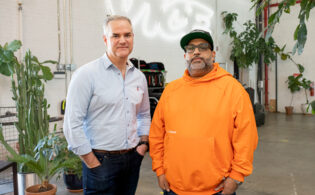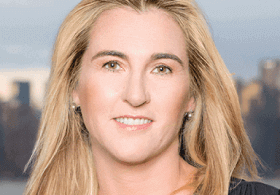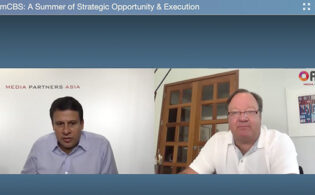Speaking at the APOS 2020 Virtual Series, VICE Media’s CEO Nancy Dubuc discussed the global reach of the company and the strength of its diversified portfolio, including its VICE Studios and Pulse Films businesses.
Dubuc was interviewed by Vivek Couto, executive director of Media Partners Asia (MPA), the organizer of APOS.
On managing the company through the COVID-19 crisis, Dubuc noted, “A lot of the work we did last year we’re doubly thankful for this year, given so much world turmoil and economic upheaval and advertising challenges we’re seeing in the U.S. and a bit globally. The global reach of VICE and the diversification of the businesses have allowed us to weather some of this turbulence more impactfully than maybe others.”
Beyond short-term cost-cutting measures, Dubuc stressed the importance of having a long-term strategy for weathering the health crisis. “When you go through this much transformation, you’re seeing audience behavior change, culture evolving. That allows you to take a bit of a long-term view as to what’s happening with your business. It really does test us all and our acumen to remember to manage for the short and long and how to balance that.”
VICE’s five different businesses—news, TV, digital publishing, the creative agency and the studios—”all have a different profile during this crisis. We’re very fortunate to be about 30 percent ad-supported and the rest is other income. That does insulate us a bit from what’s going on.”
“We’re still on a path to be profitable in the fourth quarter,” Dubuc continued. “And that’s sustained profitability through next year. All businesses that began as digital natives years ago have had to learn discipline. With each quarter that passes, the speed at which the media industry is moving requires you to adjust and invest in areas like studios or news, where there’s opportunity, and it requires you to contract in some areas like platform publishing, where the revenue just isn’t there to justify some of the costs that we’re seeing to produce the kind of quality and award-winning content we want to produce at VICE.”
On VICE News specifically, Dubuc said, “We’re appreciative to the many years HBO helped us build that brand in the U.S. When I got to VICE and took a look at each of the departments and tried to decipher how to structure and organize the company, it was apparent to me that the credit we were rightfully given for the News brand was actually far larger than its reach. It was just on HBO. We all know we’re consuming news in myriad ways, so to grow this business for the long term we had to think about it more multi-dimensionally than we were. That led us to launch an audio department [for podcasts]. We have the Showtime series. And the VICE News brand really only existed in the U.S. and there was a tremendous unmet need and appetite for news globally. About 60 percent of the eyeballs for our company are outside of the U.S. That brand really needed to take hold around the world. We think a lot about where young people are; 90 percent of news consumption in people under the age of 35 is on their smartphones. We’re tailor-made to be able to accommodate those needs, given the offices we have around the world.”
Asked about cultural differences around the world, Dubuc responded, “It comes down to our local teams. We are a view from the street and we’re a young brand that likes to question truth to power and likes to push the limits of what we cover and how we cover it. But we also know every culture is in a different place in its cultural transformation and where it is in its ideology, and we see it as our responsibility to push against those limits but also respect those limits. In order to find that space, we rely heavily on our local teams. That local flavor is really what sets us apart.”
Investing in content creation via VICE Studios and Pulse Films has been a key initiative for the company, with successes like Gangs of London on Sky. Pulse also has series in production or development with Netflix and Amazon globally. At VICE Studios, “they’re working both globally and locally,” Dubuc said. “We have a lot of commissions coming out of India, LatAm and Singapore, as well as the global commissions we’re doing for those platforms.”
VICE News generates a lot of IP, Dubuc continued. “That IP can then move into the studio or move into the TV network. We’re seeing that the studio arm can capitalize on the development that the digital platform is able to do and the IP that we’re able to create [at VICE News].”
VICE Studios and Pulse Films will be key drivers of the company’s non-advertising revenues. “There’s a huge appetite for quality content. While we may have had our challenges over the years at VICE, with operational issues or other cultural issues, one area we have been steadfast in is the quality content we create, regardless of the situation we’re faced with. Being able to tell great stories consistently, with the lens we have and the quality of storytelling we have, is one of our superpowers. I see the studio business really growing.”
Dubuc went on to discuss the role of aggregators, noting that “curation is becoming more and more of a problem for consumers. There’s what the ‘algorithm’ curates and there’s what the human eye and the human touch and a brand can curate and what that means to consumers. There’s a real trust and relationship that develops with a consumer when you have a powerful brand. As more content is being produced and the platforms continue to proliferate, and as this next generation defines what it wants its media diet to look like, the greater need there is going to be for curation.”





